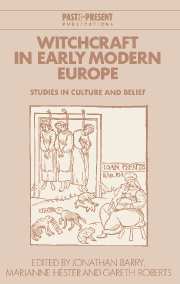Book contents
- Frontmatter
- Contents
- Preface
- Contributors
- 1 Introduction: Keith Thomas and the problem of witchcraft
- PART 1 THE CRIME AND ITS HISTORY
- PART 2 WITCHCRAFT AND RELIGION
- 5 The devil's encounter with America
- 6 ‘Saints or sorcerers’: Quakerism, demonology and the decline of witchcraft in seventeenth-century England
- PART 3 THE MAKING OF A WITCH
- PART 4 WITCHCRAFT AND THE SOCIAL ENVIRONMENT
- PART 5 DECLINE
- Index
- Past and Present Publications
5 - The devil's encounter with America
Published online by Cambridge University Press: 06 July 2010
- Frontmatter
- Contents
- Preface
- Contributors
- 1 Introduction: Keith Thomas and the problem of witchcraft
- PART 1 THE CRIME AND ITS HISTORY
- PART 2 WITCHCRAFT AND RELIGION
- 5 The devil's encounter with America
- 6 ‘Saints or sorcerers’: Quakerism, demonology and the decline of witchcraft in seventeenth-century England
- PART 3 THE MAKING OF A WITCH
- PART 4 WITCHCRAFT AND THE SOCIAL ENVIRONMENT
- PART 5 DECLINE
- Index
- Past and Present Publications
Summary
When future historians look back on witchcraft historiography as it has developed in recent decades it is likely that they will place it in the context of a reaction against the parochial tendencies of nineteenth-century positivism. This will look in vain for such misdescriptions of cultures and ages as can be detected in writers like Frazer and Tylor, or Lecky and Dickson White. They will find almost no attempts to analyse human society in terms of an opposition between reason and irrationality. And if they place the two historiographies in a comparative context they will no doubt find late-twentieth century scholarship, unlike that of the nineteenth century, conspicuous for its lack of self-confidence.
Some might place this apparent timidity in the context of a growing realisation that any distinction between ‘reason’ and ‘superstition’, however unavoidable it may seem, is riddled with difficulties, and they will thus value the shift from strictly intellectual explanations of witchcraft to the more helpful attempts to explain the phenomenon as the outcome of specific social strains and conflicts.
There can be no question that this shift has been a welcome development; but it cannot be denied that it has also led to a neglect of the more intellectual aspects of the problem. To suggest that there is now a need to redress this imbalance is not to advocate a return to the concepts of the late Victorian age but, as Alasdair MacIntyre has put it, to prevent ‘the perception of those concepts as culture-bound’ from leading ‘to a blindness to the importance of ascriptions of rationality and irrationality in the human sciences’.
- Type
- Chapter
- Information
- Witchcraft in Early Modern EuropeStudies in Culture and Belief, pp. 119 - 144Publisher: Cambridge University PressPrint publication year: 1996

